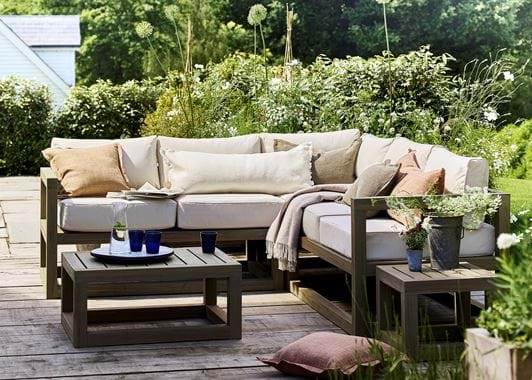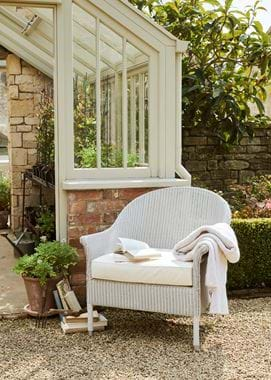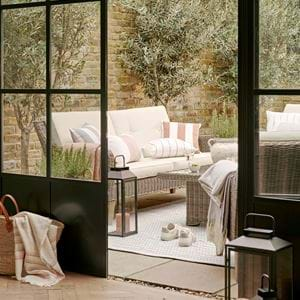How to zone your garden
How to zone your garden
At Neptune, we talk a lot about seeing your garden as another room of your home. But in actual fact it’s more like an open-plan room: one space in which you’ll relax, entertain, eat and even cook. One of the clever things that we can do to help our gardens accommodate all this is ‘zoning’. This design practice has long been popular in open-plan interiors, but in our gardens, it’s a technique that still feels a bit overlooked.
Quite simply, zoning is about separating a space into different areas (or zones) based on how you use them. It makes the layout more thought out. It makes things feel more organised. It’ll help you make the most of every inch.
You don’t need a big garden to zone it. In fact, this technique really comes into its own in a smaller space because large gardens can be broken up into individual rooms using hedges or walls, rather than needing to function as open-plan. Even a small courtyard garden has the potential to have more than a few zoned sections.
In this article, we’ve suggested some of the areas that you might like to make room for in your outside spaces. Then when it comes to actually setting out your garden zones, you might find this article where our store designer Fred suggests three possible layouts helpful. Together, hopefully they can inspire you to see past the turf and beyond the paving to something much more exciting and inviting.
How many zones?
Garden zoning can be as functional or as fanciful as you like. If you’d rather keep it to a few core zones such as a place to eat, a place to store things, and place to grow, that’s perfectly fine.
But, if you’re looking to transform your garden into something that feels a little special, you can introduce as many purposeful pockets as you like, to enjoy as often as you please.
Zoning is about opportunities, and making room for the things that you want to do in your outside space in the hope that they’ll encourage you to do precisely that.
A place to entertain
This is an obvious place to start. One of the main things that we enjoy doing in our gardens is eating at the garden table. If that’s true for you, invest in a table that works with your space and your lifestyle, and set it up in the perfect spot: balancing light with shade.
You might also like to consider that this perfect spot for entertaining may not be right next to the house. While this is certainly more convenient, could there be a tucked away corner that you can transform into a more magical, atmospheric setting? The journey from house to table can be a key part of the experience.
Table for two
If your outdoors is on the roomier side, a nice touch is to introduce another table and chairs group with a different purpose. A bistro set placed away from your main dining table creates a place for you to share a morning coffee with a loved one (or to savour it all by yourself). One that’s more low-key and intimate.
A place to read
It’s never easy to find the time to put your feet up. But if there’s relaxed seating waiting for you, there’s much more of a chance that you might. By zoning a small section of your garden into a place for you to relax with a good book or glossy magazine, you’re essentially building yourself an al fresco living room. Add in a coffee or side table to echo your interior version, dress it with cushions and keep a blanket to hand, and it soon becomes something that’s near-impossible to walk past.
Grown-ups only
It can feel rather fun to have a section of your garden dedicated to pre-supper cocktails. It might be a raised deck area beneath a pergola or a cosy terraced section in a far-away corner, or it could be as simple as an outdoor console table stationed close to the house with enough space around it for mingling.
Picnics and tea parties
If you have little people in your life who love to throw tea parties with toys, or to turn lunchtimes into garden picnics, they’ll love the suggestion of having a certain patch of garden dedicated to their fun and games.
Room to grow
It might be one spot that you ‘cordon off’ for growing a certain something, or it might be one of a few growing zones that are peppered around your garden – the choice, as always, is yours. We love the idea of a couple of sections that become an environment for one type of plant: a herb garden, a cutting garden, a boggy area for watery plants. And this is something that can be done on a big scale or as small as a group of pots. You could also earmark a corner for a potting bench, giving you a clear-cut space to enjoy your green-fingered hobby (incidentally, with a bit of clearing up, this could double as that aforementioned cocktail console table too).
Dressing and dividing your zones
Garden zoning isn’t all about layout and the bigger pieces of furniture. Think about scene setting and props, and how they might add to the character of a specific area. Things like cushions and outdoor lighting of course play a part, but as this is your garden, think of the planting as your biggest decorating tool. Just as paint colours and flooring can add to the atmosphere of different zones inside, so can various planting schemes outside. Edible plants around the dining area for instance, and scented plants at head height around a relaxed seating area.
Creating clear divisions in your garden can also be helped along with the use of planters, pots and considered arrangements of garden ornaments in a similar way to how you’d use bookcases, sofas and ottomans indoors to create room dividers.
However small or large your outdoor world, and whatever you decide to devote it to, it should, above all, be a space that restores and energises. Somewhere you long to return to and love to spend time in.
Explore our garden collections online, or read Fred’s article on garden layouts here.














